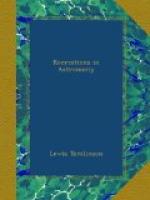“The poet’s eye, in a fine frenzy
rolling,
Doth glance from heaven to earth, from
earth to heaven;
And, as imagination bodies forth
The forms of things unknown, the poet’s
pen
Turns them to shapes, and gives to airy
nothing
A local habitation and a name.”
In the supremacy of our creative imagination let us make empty space, in order that we may therein build up a new universe. Let us wave the wand of our power, so that all created things disappear. There is no world under our feet, no radiant clouds, no blazing sun, no silver moon, nor twinkling stars. We look up, there is no light; down, through immeasurable abysses, there is no form; all about, and there is no sound or sign of being—nothing save utter silence, utter darkness. It cannot be endured. Creation is a necessity of mind—even of the Divine mind.
We will now, by imagination, create a monster world, every atom of which shall be dowered with the single power of attraction. Every particle shall reach out its friendly hand, and there shall be a drawing together of every particle in existence. The laws governing this attraction shall be two. When these particles are associated together, the attraction shall be in proportion to the mass. A given mass will pull twice [Page 6] as much as one of half the size, because there is twice as much to pull. And a given mass will be pulled twice as much as one half as large, because there is twice as much to be pulled. A man who weighed one hundred and fifty pounds on the earth might weigh a ton and a half on a body as large as the sun. That shall be one law of attraction; and the other shall be that masses attract inversely as the square of distances between them. Absence shall affect friendships that have a material basis. If a body like the earth pulls a man one hundred and fifty pounds at the surface, or four thousand miles from the centre, it will pull the same man one-fourth as much at twice the distance, one-sixteenth as much at four times the distance. That is, he will weigh by a spring balance thirty-seven and a half pounds at eight thousand miles from the centre, and nine pounds six ounces at sixteen thousand miles from the centre, and he will weigh or be pulled by the earth 1/24 of a pound at the distance of the moon. But the moon would be large enough and near enough to pull twenty-four pounds on the same man, so the earth could not draw him away. Thus the two laws of attraction of gravitation are—1, Gravity is proportioned to the quantity of matter; and 2, The force of gravity varies inversely as the square of the distance from the centre of the attracting body.




